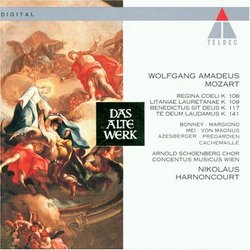| All Artists: Wolfgang Amadeus Mozart, Nikolaus Harnoncourt, Concentus Musicus Wien, Charlotte Margiono, Barbara Bonney, Eva Mei, Uwe Heilmann, Kurt Azesberger, Christoph Prégardien Title: Mozart: Regina Coeli K. 108/Litaniae Lauretanae K. 109/Benedictus Sit Deus K. 117/Te Deum Laudamus K. 141 Members Wishing: 0 Total Copies: 0 Label: Teldec Release Date: 1/24/1995 Genres: Pop, Classical Styles: Vocal Pop, Opera & Classical Vocal, Historical Periods, Classical (c.1770-1830), Sacred & Religious Number of Discs: 1 SwapaCD Credits: 1 UPC: 745099614720 |
Search - Wolfgang Amadeus Mozart, Nikolaus Harnoncourt, Concentus Musicus Wien :: Mozart: Regina Coeli K. 108/Litaniae Lauretanae K. 109/Benedictus Sit Deus K. 117/Te Deum Laudamus K. 141
CD Details |
CD ReviewsA voice teacher and early music fan George Peabody | Planet Earth | 02/15/2007 (5 out of 5 stars) "ARNOLD SCHOENBERG CHOIR DELIVERS AN IMPASSIONED MOZART!
Amadeus Mozart (1756-1791) Every piece of music that Mozart wrote bears the mark of the unique genius that he was; so much so that Haydn said of him (to his father), "I declare to you upon my honor that I consider your son the greatest composer I have ever heard." "Sounds and sweet airs that give delight and hurt not" crowded his mind giving him no peace until he put them on paper. The result is an incredible number of works that are designed to soothe, caress, comfort and charm.. He wrote in his many letters, while traveling all over Europe, that "passions, whether violent or not, must never be expressed in such a way as to excite disgust, and even in the most terrible situations,must never cease to be 'music'." And I believe that his works attest to his belief. Most of his sacred music was written in his younger days while he still lived in Salzburg, but they show a maturity far beyond his years, and they are truly magnificent compositions. They fall into two groups: on the one hand, works intended for the Proper of the Mass, and on the other, pieces composed for the Divine Office. I'll comment on two of my favorites on this recording. The "Regina coeli" is one of four Marian antiphons that were sung at Compline between Easter Saturday and the Saturday following Pentecost. Written in Salzburg in 1771, its cyclical structure reveals the influence of the Neopolitan sinfonia (he had just returned from his visit to Italy), while the additional use of trumpets underscores its festive character. The solo motet 'Ergo interest-Quaere superna' was composed in Milan in 1770, and is written in the ecclesiastical style of the period. It is cast in the form of a recitative and aria, and is one of a number of works with a sacred, but not liturgical text. As to the rendition of all of these beautiful compositions, we can only say that they are performed with expertise and artistry. The primary singers are the soloists,of which there are : 3 sopranos,1 alto,4 tenors and 1 bass; all enhanced by a very good Arnold Schoenberg Choir. The leading soprano (she had the most solos) was actually my favorite:Barbara Bonney. She has consistently good diction and her tone quality is such that it does not 'muddy' it up. Sopranos seem to have a tendency to overfocus on their sound, and that is important, but so is the conveyance of the meaning of the song! Elisabeth von Magnus has an alto voice that at times can get heavy, but that did not happen in her three solo spots on this disc. The four tenors were all quite good, and each soloed only once on this recording as did the one bass; all quite skilled. I have always found Nicolaus Harnoncourt very capable at whatever he puts together, so you can't go wrong with this disc if you are a Mozart fan. I have another recording that he directed with Sylvia McNair and Bonney doing some of the solo work; it's excellent: Mozart 'Grabmusik K 42, Regina Coeli K. 127 and Ave Verum Corpus." |


 Track Listings (20) - Disc #1
Track Listings (20) - Disc #1